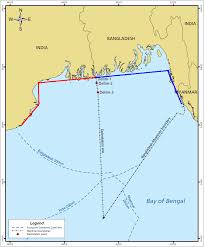Yes, it is absolutely necessary to be pro-active to navigate our nation to a bright future. With this in mind, Bangladesh established the Marine Fisheries Academy in 1972. It is the only academy of its type in the entire South Asia. Now after 45 years of its establishment, let’s analyze the achievement in the fishing industry and how much these graduates are used in harvesting the bounties of the Bay of Bengal and the Indian Ocean.
- Do we have a robust fishing fleet?
- With a huge maritime boundary now internationally recognized, do we have enough security and large fishing vessels to employ all these graduates out of the Marine Fisheries Academy?
- Who is harvesting the fishing bounties in the Bay of Bengal these days?
- What are these graduates doing to apply their academic knowledge and practical training?
You may find some answers by surfing the net. Actually you will not find much because our fishing activity in the seas and the oceans is miniscule.
Bangladesh Marine Academy formerly known as the Juldia Marine Academy which changed names few times thereafter was established in 1962 in a sprawling 200 acres campus in Juldia, Chittagong.
Since the inception, BMA produced over 3000 professionals who excelled in sea careers worldwide and remitted a lot of foreign currency home. While the Marine Fisheries Academy produced 1300 graduates and many ended up competing for the same jobs of the BMA cadets. Only a few took up jobs in the fishing vessels plying in the Bay of Bengal.
These two academies were established for 2 different purposes. Fisheries Academy is operated by the Fisheries Ministry for the sole purpose of educating cadets to serve the expanding fishing fleets whereas, BMA is under the Shipping Ministry with the sole purpose educating cadets for a career in the ocean going vessels.
With the 200 nautical miles of exclusive economic zone, 18,813 sq. km of waters comprising territorial sea, exclusive economic zone and also undeniable sovereign rights in the seabed extending as far as 354NM from the Chittagong coast in the bay ensures Bangladesh with explorations for minerals, oil, gas and vast marine fisheries. It is time for us to build larger fishing vessels including the one’s with processing and packing facilities. The fisheries graduates must be employed gainfully to extract these resources and not divert them into sailing on foreign ships. Let’s keep our aim in the right track and not deviate.
Like many misdirected activities, the Fisheries Academy now trains cadets to serve ocean going merchant vessels as it is more lucrative then serving fishing vessels convoluting the original purpose. Additionally, the PM decreed opening of four more Marine Academies (Barisal, Pabna, Rangpur and Sylhet) and a Maritime University under the supervision of the Navy.
One wonders if there was a discussion or public hearings that were used to analyze these massive expansion of training facilities while the job market in ocean going vessels have depleted ten-folds in the last few years. One wonders how government makes plans like these. When people’s money is used to plan and build something, logically the people should be consulted for such an expense.
BMA cadets are struggling hard to seek employment in the foreign flagged vessels as the Bangladeshi shipping industry (for the purpose of sea employment) is almost non-existent. In the last couple of decades, shipping industry has been destroyed by the maritime policies which are counter-productive to development. We are no longer a maritime nation of any significance.
Against the backdrop of this depressing scenario, our sailors have become pariah in the eyes of foreign ship owners for many reasons. Several countries have stringent visa requirements which disallows the Bangladeshi seamen to board or disembark vessels in their soil. All these combined, we are having the worst period for the employment of these graduates of the Marine Academy.
In this recessionary employment scenario, we have added 20 private academies that sprouted in the backyards of fish markets or shopping malls producing another 500 to 1000 cadets per year. Many of these private academies extract a high tuition fee from the students (as much as 20 lacs for 2 year training) while providing below grade education. There is virtually no supervision to their operations. Most of these permits were issued in last 5 years.
So one wonders, do we have a maritime policy or are we proceeding in the uncharted ocean? What is the future of the historical Bangladesh Marine Academy?
Ghulam Suhrawardi
Author of Bangladesh Maritime History
Publisher – South Asia Journal











I applaud the writer for the article that brings about a very important issue in an interesting and timely manner. It is imperative that the government policies reflect the need of the day and foreseeable future. With the affirmation of the exclusive economic this country with large population but small land mass could benefit from the resources in the sea. Let’s use the trained people that the institution produced. The government should be the facilitator through regulatory process and funding guarantees; let the private sector do the job!